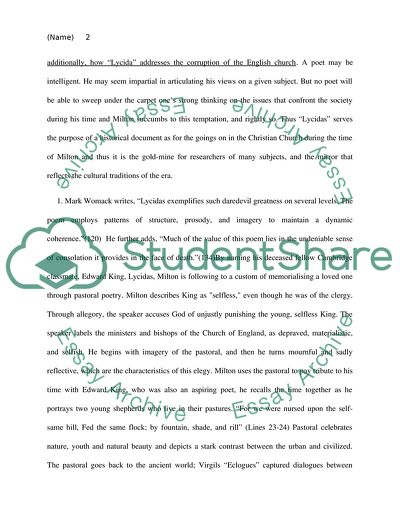Cite this document
(“John Miltons use of the pastoral in his poem Lycidas, transforms a Essay”, n.d.)
John Miltons use of the pastoral in his poem Lycidas, transforms a Essay. Retrieved from https://studentshare.org/english/1667886-john-miltons-use-of-the-pastoral-in-his-poem-lycidas-transforms-a-work-of-mourning-into-a-work-of-spiritual-consolation-and-additionally-how-lycidas-addresses-the-corruption-of-the-english-church
John Miltons use of the pastoral in his poem Lycidas, transforms a Essay. Retrieved from https://studentshare.org/english/1667886-john-miltons-use-of-the-pastoral-in-his-poem-lycidas-transforms-a-work-of-mourning-into-a-work-of-spiritual-consolation-and-additionally-how-lycidas-addresses-the-corruption-of-the-english-church
(John Miltons Use of the Pastoral in His Poem Lycidas, Transforms a Essay)
John Miltons Use of the Pastoral in His Poem Lycidas, Transforms a Essay. https://studentshare.org/english/1667886-john-miltons-use-of-the-pastoral-in-his-poem-lycidas-transforms-a-work-of-mourning-into-a-work-of-spiritual-consolation-and-additionally-how-lycidas-addresses-the-corruption-of-the-english-church.
John Miltons Use of the Pastoral in His Poem Lycidas, Transforms a Essay. https://studentshare.org/english/1667886-john-miltons-use-of-the-pastoral-in-his-poem-lycidas-transforms-a-work-of-mourning-into-a-work-of-spiritual-consolation-and-additionally-how-lycidas-addresses-the-corruption-of-the-english-church.
“John Miltons Use of the Pastoral in His Poem Lycidas, Transforms a Essay”, n.d. https://studentshare.org/english/1667886-john-miltons-use-of-the-pastoral-in-his-poem-lycidas-transforms-a-work-of-mourning-into-a-work-of-spiritual-consolation-and-additionally-how-lycidas-addresses-the-corruption-of-the-english-church.


